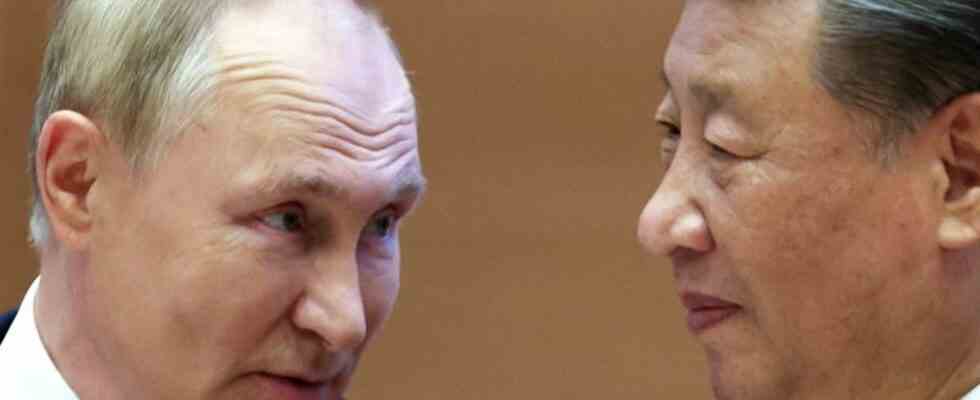difficult partnership
The enemy unites: Russia and China pull together
Vladimir Putin and Xi Jinping at the Shanghai Cooperation Organization (SCO) summit. photo
© Sergei Bobylev/Pool Sputnik Kremlin/AP/dpa
Kremlin chief Putin publicly admits that China’s head of state and party leader Xi Jinping is concerned about Russia’s war of aggression against Ukraine. But despite all the contradictions, the two opponents United States.
The fact that China’s head of state and party leader Xi Jinping spoke to Vladimir Putin without a mask on his first trip abroad in more than two and a half years has been celebrated by Moscow’s media as a success. The Kremlin boss has always given a damn about masks to protect against the corona virus.
On Friday, in the oriental idyll of the millennia-old Uzbek city of Samarkand, the 69-year-old Putin tried to unite with his “friend” from China, the same age, in the pursuit of a multipolar world. After all, Putin himself acknowledged that Xi Jinping has questions and concerns about Russia’s war against Ukraine.
But the Russian praised China’s overall position as “balanced” at the Shanghai Cooperation Organization (SCO) summit. In the UN Security Council, the two veto powers are pulling in the same direction. And Putin used the meeting of heads of state in the Central Asian city, where the politicians also planted trees together, to show the world that he was by no means as isolated internationally as the West would like.
“I should say that recent attempts to create a monopolar world have taken absolutely ugly forms and are absolutely unacceptable for most of the world’s states,” Putin told the mostly autocratic leaders. The head of the Kremlin happily pointed out that the SCO members China, India and others represent a large part of the world’s population. The Shanghai organization is now the world’s largest regional organization. And it should grow, which Xi Jinping also advocated.
Jinping’s misstep cut from video
His trip abroad began with a small slip on the airplane steps. At one step, Xi Jinping slipped his right foot down the red carpet, but the 69-year-old was able to quickly grab the railing. “A bad omen”, “He’s a bit rusty, hasn’t been out for a long time” or “Unstable?” Scorned comments on the Internet. China’s state television promptly cut the misstep from video of the ceremonial reception at the airport in Nur-Sultan, Kazakhstan.
Despite the mishap, Xi Jinping was able to appear as a “strongman” as usual when he returned to the international stage and, above all, when he met Putin. The two last met in Beijing in February for the Winter Olympics – a few weeks before Russia invaded Ukraine. Almost jovially, China’s state and party leader noted that the Russian president expressed understanding for Chinese “concerns” in the Ukraine crisis – knowing full well that he was demanding a lot from his Chinese partner for their support in the crisis.
Xi Jinping made no public mention of Ukraine, but described Putin as an “old friend”. He wants to cooperate with Russia in order to support “the respective core interests of the other”. However, the asymmetry between economic giant China and its recession-stricken neighbor Russia was felt. Even before the war and sanctions, the imbalance was great. It has grown again. Today, Russia needs China more than the other way around. In the “foreign policy tandem” that Putin invokes, Beijing is at the helm. US State Department spokesman Ned Price found it “striking” that Putin of all people openly acknowledged “concerns” on the part of the Chinese side.
Jinping at Putin’s side in the geopolitical power game
Even if China may not like the war and the Middle Kingdom has always had an ambivalent relationship with Russia, Xi Jinping is firmly on Putin’s side in the geopolitical power game in order to make a front against the rival USA and the West. “Relations between China and Russia are unlikely to become divided or confrontational, as expected and encouraged by the United States and the West,” writes the Chinese party newspaper Global Times.
The common enemy, the securing of power, the fear of a collapse like in the Soviet Union and the goal of a new world order that is being striven for – far from democracy, human rights or a rules-based order: all these things unite China and Russia more than the Ukraine war is able to separate them. That’s what it was all about at the summit in Samarkand. The fact that warships from both countries went on patrol in the Pacific parallel to the summit was also intended as a demonstration of power.
Putin was once again in his element during the many bilateral talks, including with Turkish President Recep Tayyip Erdogan, who was a guest at the summit. At the informal dinner on the eve of the summit, all heads of state and government lined up next to the Russian president. But Xi Jinping was absent – perhaps more for fear that it would be too informal and that he could catch the virus. That’s why he hadn’t left his country since the beginning of 2020 – and usually kept his distance in Samarkand with mouth and nose protection.
Regardless of the outcome of the war in Ukraine, China remains the winner, believes Yun Sun, director of the China program at the Stimson Center in the US. “If Russia wins, China will gain a powerful ally. If Russia loses, it will likely become a vassal state of China,” Yun Sun told the Wall Street Journal.

